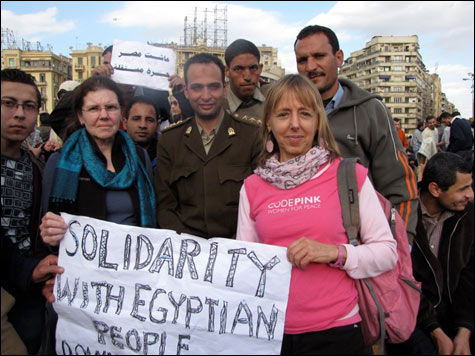
IN TAHRIR SQUARE Medea Benjamin and Egyptian activists. |
The death of Osama bin Laden and the impending 10-year anniversary of the September 11 attacks have many people contemplating the gains and futility of nearly a decade of American engagement overseas, and assessing the successes of popular movements both here and abroad. A major figure in the international peace movement is Medea Benjamin, who co-founded both CODEPINK (a grassroots peace-and-justice organization that focuses on women's activism) and Global Exchange (an international human-rights group). She'll be in Portland this weekend, speaking at the Peace Action Maine annual supper and promoting CODEPINK's War Dollars Home Resolution, through which US mayors call on Congress to "redirect military spending to domestic priorities." We talked to her about bin Laden, Egypt, and the status of US peace-niks.
WHAT ARE YOUR THOUGHTS ON THE DEATH OF OSAMA BIN LADEN? I feel that it's a time for reflection. That it's a time for remembering and mourning all the people who died on 9/11, and the soldiers . . . and the Iraqis and the Afghans who have died. And for a time of reversal of a cycle of violence that needs to stop after almost 10 years. This is the time we're calling on Obama to bring our troops home . . . and to invest our resources into rebuilding America, which is the key to our security.
DO YOU THINK THIS NEWS WILL BRING ABOUT A SHIFT IN US FOREIGN POLICY? It could if there's enough pressure from the people. We want there to be real meaning in the death of Osama bin Laden. If we killed a mass murderer, we should use the moment to advocate just the opposite, which is an end to violence. We're calling on peace-loving people around the country to use this opening to pressure the Congress and the White House. It should be a moment that people seize.
TELL ME ABOUT BEING IN CAIRO DURING THE EGYPTIAN REVOLUTION EARLIER THIS YEAR. I had the most incredible opportunity of a lifetime, which was to witness a revolution — a non-violent revolution. It's something that will stay with me forever — the yearning that the Egyptian people had to free themselves of a 30-year dictatorship . . . to show the power of non-violent resistance, the way people took care of each other. I think for the next decade we'll be talking about this "Arab Spring" and how it changed the face of the Middle East and I think will force a change in US policy.
HOW SO? I think there is a real desire for a secular government [in the Middle East] and a lot of young people who are sophisticated and have very clear opinions about wanting secular governments that allow for the respect of people's rights to basic freedoms. [But] I still see that the US government supports some undemocratic regimes, like Saudi Arabia. We are in the final stages of a $60 billion arms sale to a very repressive monarchy that uses its military might not only to suppress its own people but now to suppress the people of Bahrain. That's just one example. Throughout the Middle East we can see examples of US weapons being used by dictators against their own people. We've got to stop the out-of-control arms sales.
 Topics
Topics:
This Just In
, Politics, Middle East, Afghanistan, More  , Politics, Middle East, Afghanistan, Iraq, Osama bin Laden, Egypt, Saudi Arabia, War, Medea Benjamin, CODEPINK, Less
, Politics, Middle East, Afghanistan, Iraq, Osama bin Laden, Egypt, Saudi Arabia, War, Medea Benjamin, CODEPINK, Less 